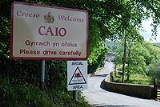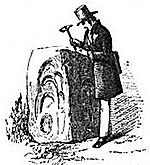
Caio
Encyclopedia

Village
A village is a clustered human settlement or community, larger than a hamlet with the population ranging from a few hundred to a few thousand , Though often located in rural areas, the term urban village is also applied to certain urban neighbourhoods, such as the West Village in Manhattan, New...
in the county of Carmarthenshire
Carmarthenshire
Carmarthenshire is a unitary authority in the south west of Wales and one of thirteen historic counties. It is the 3rd largest in Wales. Its three largest towns are Llanelli, Carmarthen and Ammanford...
, south-west Wales
Wales
Wales is a country that is part of the United Kingdom and the island of Great Britain, bordered by England to its east and the Atlantic Ocean and Irish Sea to its west. It has a population of three million, and a total area of 20,779 km²...
, sited near to the Dolaucothi Gold Mines
Dolaucothi Gold Mines
The Dolaucothi Gold Mines , also known as the Ogofau Gold Mine, are Roman surface and deep mines located in the valley of the River Cothi, near Pumsaint, Carmarthenshire, Wales...
.
Location
It is located between LlandoveryLlandovery
Llandovery is a market town in Carmarthenshire, Wales, lying on the River Tywi and the A40 road.The town is served by Llandovery railway station, where there is a park and ride to Llanelli and Shrewsbury via the Heart of Wales Line...
and Lampeter
Lampeter
Lampeter is a town in Ceredigion, South West Wales, lying at the confluence of the River Teifi and the Afon Dulas.-Demographics:At the 2001 National Census, the population was 2894. Lampeter is therefore the smallest university town in both Wales and the United Kingdom...
, 1 mile north-east of the A482
A482 road
The A482 road is a major route in the Welsh counties of Ceredigion and Carmarthenshire.It connects Aberaeron on the coast and the A40 road at Llanwrda near Llandovery and is in length.-Route:...
that connects these two towns. Caeo lies at the confluence
Confluence
Confluence, in geography, describes the meeting of two or more bodies of water.Confluence may also refer to:* Confluence , a property of term rewriting systems...
of the Afon Annell
Afon Annell
Afon Annell is a small river in Carmarthenshire, Wales. Its source is in the Cambrian Mountains and it flows south-westerly via the settlements of Caio and Crugybar until it joins the River Cothi around 2 km east of Llansawel. Some of the waters of the Annell were previously diverted via aqueduct...
and the Nant Frena. It forms part of the parish of Cynwyl Gaeo
Cynwyl Gaeo
Cynwyl Gaeo is a parish and community located in Carmarthenshire, Wales....
.
History

Parish church
A parish church , in Christianity, is the church which acts as the religious centre of a parish, the basic administrative unit of episcopal churches....
, consecrated to Saint Cynwyl, now stands at the centre of the village, near the Roman road
Roman road
The Roman roads were a vital part of the development of the Roman state, from about 500 BC through the expansion during the Roman Republic and the Roman Empire. Roman roads enabled the Romans to move armies and trade goods and to communicate. The Roman road system spanned more than 400,000 km...
that linked the Roman forts at Llandovery
Llandovery
Llandovery is a market town in Carmarthenshire, Wales, lying on the River Tywi and the A40 road.The town is served by Llandovery railway station, where there is a park and ride to Llanelli and Shrewsbury via the Heart of Wales Line...
(Alabum) and Llanio (Bremia
Bremia
Bremia is the name of the Roman fort in Llanio, West Wales. The fort was used by the Romans between AD 75 to AD 120 in Roman Wales. The fort was situated on Sarn Helen , a Roman road leading north from the fort at Dolaucothi. It has produced an inscription dedicated to a cohort from the Asturias,...
), and the Roman
Roman Britain
Roman Britain was the part of the island of Great Britain controlled by the Roman Empire from AD 43 until ca. AD 410.The Romans referred to the imperial province as Britannia, which eventually comprised all of the island of Great Britain south of the fluid frontier with Caledonia...
gold mines at Dolaucothi
Dolaucothi Gold Mines
The Dolaucothi Gold Mines , also known as the Ogofau Gold Mine, are Roman surface and deep mines located in the valley of the River Cothi, near Pumsaint, Carmarthenshire, Wales...
. The Roman road remained in use until the late 18th century, mainly as a cattle-road or Drover's road. The Dolaucothi Estate
Dolaucothi Estate
The Dolaucothi Estate, or as it was often later spelt, Dolaucothy Estate is situated about one mile north-west of the village of Caio in the upper reaches of the picturesque Cothi valley in the parish of Cynwyl Gaeo, Carmarthenshire...
long held by the Johnes family is now a tourist attraction owned by the National Trust
National Trust for Places of Historic Interest or Natural Beauty
The National Trust for Places of Historic Interest or Natural Beauty, usually known as the National Trust, is a conservation organisation in England, Wales and Northern Ireland...
. A pounding-stone long known as Carreg Pumsaint and a possible holy well
Holy well
A holy well, or sacred spring, is a small body of water emerging from underground and revered either in a Pagan or Christian context, often both. Holy wells were frequently pagan sacred sites that later became Christianized. The term 'holy well' is commonly employed to refer to any water source of...
are located nearby.
Llywelyn ap Gruffydd Fychan
Llywelyn ap Gruffydd Fychan
Llywelyn ap Gruffydd Fychan of Caeo was a Welsh landowner, a squire in effect, who in 1401 organized a decoy of Henry IV's English forces searching for the Welsh resistance leader Owain Glyndŵr. The deception allowed Owain to escape but involved Llywelyn in putting his life on the line...
(c. 1341 – 9 October 1401) was a Caio landowner, who was executed by Henry IV
Henry IV of England
Henry IV was King of England and Lord of Ireland . He was the ninth King of England of the House of Plantagenet and also asserted his grandfather's claim to the title King of France. He was born at Bolingbroke Castle in Lincolnshire, hence his other name, Henry Bolingbroke...
for his alleigance to Owain Glyndŵr
Owain Glyndwr
Owain Glyndŵr , or Owain Glyn Dŵr, anglicised by William Shakespeare as Owen Glendower , was a Welsh ruler and the last native Welshman to hold the title Prince of Wales...
. The hymnist Dafydd Jones (1711–1777), also known as Dafydd Jones o Gaeo was born in the area. Two other hymnists, the brothers John Dafydd (1727–1783) and Morgan Dafydd (m. 1762) are also connected to the village.
The oldest record of a chapel in the village is the Tynewydd Calvinistic Methodists
Calvinistic Methodists
Calvinistic Methodists are a body of Christians forming the Presbyterian Church of Wales and claiming to be the only denomination of the Presbyterian order in Wales which is of purely Welsh origin.-Early history:...
chapel which was built around 1774. Ysgol Gynradd Caio stands next to the church, and was built in 1869. It teaches primarily through the medium of Welsh
Welsh language
Welsh is a member of the Brythonic branch of the Celtic languages spoken natively in Wales, by some along the Welsh border in England, and in Y Wladfa...
.
Amenities
Other amenities include Caio Post Office and a public house, the Brunant Arms. At the turn of the century there were several public houses, the "Brunant Arms", the "Sexton's Arms", which was run out of someone's front room, and the "King's Head Inn".In 1966 BBC Wales
BBC Wales
BBC Cymru Wales is a division of the British Broadcasting Corporation for Wales. Based at Broadcasting House in the Llandaff area of Cardiff, it directly employs over 1200 people, and produces a broad range of television, radio and online services in both the Welsh and English languages.Outside...
produced the documentary "A village called Caio" about rural life in rural West Wales. They paid a retrospective visit in 2008, to see how the village had changed.

